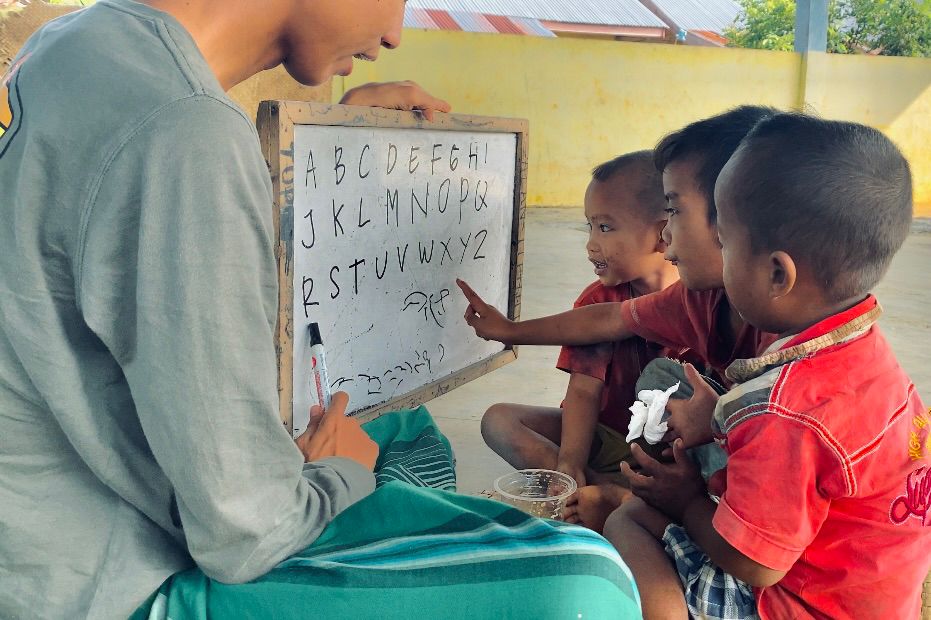In the midst of the rapid progress of the times, there are small voices that seem to be ignored. The voices come from a group of children in the middle of the Jambi forest, part of the Suku Anak Dalam (SAD) community. They live in limitations, far from the luxuries of the modern world, but have the right to a better future. A big question arises: how can the celebration of Children's Day be a bridge to help them gain proper access to these rights?
That afternoon, a car drove slowly into the Suku Anak Dalam settlement in Pematang Kejumat Village, Bathin VIII District, Sarolangun Regency. The car had traveled two hundred kilometers from Jambi City. Passing steep, dusty roads, and surrounded by oil palm plantations. A journey that might sound difficult to some people, but is part of the routine for the Pundi Sumatra team who often visit remote indigenous communities such as SAD.
“Good afternoon, Sir. Sayo Tari, bring gifts for the children here. Come on, gather in the hall,” said a woman as she got out of the car. Tari, a member of Pundi Sumatra, came with something special for the children of Suku Anak Dalam. In her hands was a hygiene kit package prepared by the Tumbuh Bahagia team, consisting of towels, toiletries, and blankets. There were ninety packages to be distributed to children in four villages assisted by Pundi Sumatra, three in Sarolangun Regency and one in Bungo Regency.
While distributing the packages, Pundi Sumatra facilitator Arief explained, “These are for your children, parents, not for adults. Make sure they use these when they bathe so they are cleaner.” In addition to giving hygiene kit, there was also socialization regarding Clean and Healthy Living Behavior (PHBS), which was guided by interns from Pundi Sumatra.
Cleanliness in the SAD indigenous community is still a crucial issue. Negative stigma often sticks to them, considered unclean and unhealthy by the surrounding community. The division hygiene kit is a small but important effort to reduce the stigma. While supporting better hygiene practices in the community.
However, the biggest challenges faced by SAD children are not just about hygiene. Access to health services and education are also major barriers that prevent them from obtaining their basic rights. Long distances to health facilities and low health literacy make them vulnerable to disease. Parents in SAD communities tend to rely more on traditional medicine than modern health services, which, while useful in some cases, are often ineffective in treating infectious or chronic diseases.
Reliance on shamans and herbal medicine is also a problem. Although plants such as gambir leaves and starfruit have benefits as traditional medicine, the lack of interaction with modern health facilities means that SAD children do not receive more effective medical treatment, especially in terms of disease prevention through vaccination.
On the other hand, access to education for SAD children is also hampered by the community's nature-focused lifestyle. Many children are more often involved in hunting, gathering forest products, or farming with their parents than attending school. This causes them to lag behind in formal education, missing out on opportunities to learn skills that will benefit their future.
Amidst the limitations, SAD children grow up with food obtained from the forests and rivers around them. In the past, these food sources were abundant, in the form of tubers, forest fruits, and fish from the river. However, with the increasing clearing of land for palm oil plantations and commercial agricultural activities, these food sources are starting to disappear. The shrinking forests and polluted rivers are making it increasingly difficult for the SAD community to obtain nutritious food.
The loss of local food sources not only reduces their food intake, but also threatens local wisdom that has been passed down from generation to generation. SAD's local food sources are part of their cultural identity, reflecting their independence and connection to nature. When these sources disappear, SAD children not only lose access to food, but also lose part of their cultural heritage.
However, hope for the future of SAD children is not yet lost. Pundi Sumatra, together with local governments and other institutions, continues to strive to encourage positive change for them. In Bungo Regency, for example, a special posyandu group was formed under the name Aoh Bergesih. This posyandu not only provides basic health services such as routine check-ups, but also provides traditional medicine rooms and psychological counseling for women.
"The establishment of this posyandu aims to integrate local wisdom into their health practices, while raising awareness about the importance of maintaining health," said Dewi Yunita, CEO of Pundi Sumatra. With this approach, SAD children get better health services without having to sacrifice their cultural identity.
SAD children are the hope for the sustainability of this indigenous community. They have great potential to bring change to their community, as long as their basic rights are fulfilled, from access to health, education, to adequate food. Empowerment efforts such as those carried out by Pundi Sumatra are not aimed at erasing indigenous traditions, but rather strengthening them by integrating local values into health and education programs.
Despite their limitations, SAD children still have the right to a better future. They are the next generation who will preserve Jambi's rich cultural and natural heritage. With the right support, they can grow into healthy, intelligent individuals who are able to adapt to the modern world without forgetting their cultural roots.


